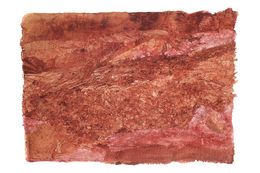Discover the luminous and intense sculpted painted cardboards of Jacques Rouby (1953-2019). Jacques Rouby, the aesthetics of mystery
"An experimental dreamer, passionate about graphic adventures, and deliberately marginal, Jacques Rouby plunges into the depths of floating inspiration and uncontrolled intuition. Randomness speaks, and accidents are welcome. In an interview, Jacques Rouby speaks of the intervention of chance, which is my master (sic). Elsewhere, he says: something appears and I can intervene, but not always... I don't calculate." Finely colored, his sculpted cartoons are scarred, dotted with scratches, scratched, scraped, scarified, and riddled with bursts of staples... Craters, lava, erosion, sedimentation in patches—the gaze is projected onto unusual topographies, suggesting aerial views of unknown planets, extraterrestrial lurches, or virgin lands resulting from underwater exploration. The imagination is invited to a total A change of scenery...
We think of Dubuffet's texturologies, his inventories of materialologies, uninventoried spaces, ignored by maps, close neighbors of Henri Michaux's turbulent infinity or his journey to the Grande Garabagne. Rouby lives like Michaux, in an imaginary country that he also has the pleasure of creating almost unwittingly. "I experience my art as a journey," he declared in an interview.
"Making and unmaking" teaches Zen philosophy. Jacques Rouby produced thousands of drawings, piled up in his studio and twice victims of flash flooding. This disaster is taken with a surprising philosophy by the artist, who considers the second phase of his work to be destruction. This notion should be understood in the sense that Leonardo da Vinci encouraged people to draw inspiration from the stains on an old wall damaged by time. "A person passionately in love with incognito, art is always there where you least expect it." "not," wrote Jean Dubuffet. Rouby is an artist of the infinitesimal, a infinitesimal rich in teeming life. An approach that partakes of an aesthetic of mystery and of the concept invented by Jankélévitch of the disappearing apparition. Hence Jacques Rouby's declared fascination with the ghostly character of Ophelia or the figure of Verlaine, a flamboyant poet, at the end of his twilight life."
Xavier Bureau, 2025
Read more
